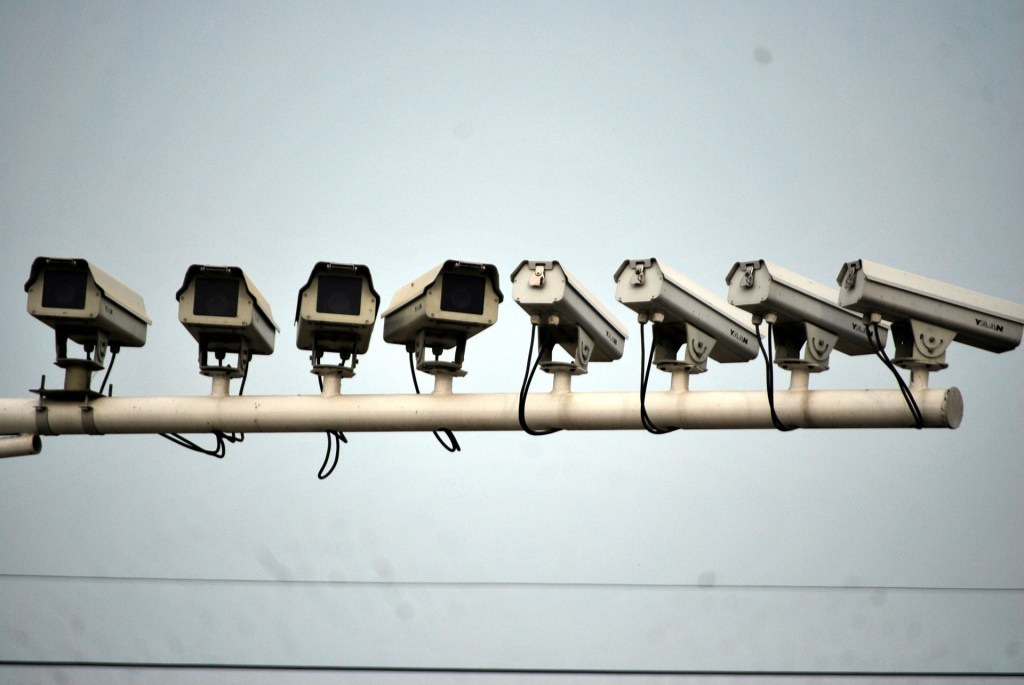Watch our full VICE on HBO episode with Edward Snowden for free below and read more of our privacy and security coverage here.
Openly critical of the Chinese government, artist activist Ai Weiwei knows what it’s like to be under surveillance. The artist was arrested in 2011 for being an outspoken critic of the communist regime and has had countless run ins with censorship through much of his art practice. Hitting the West Coast for the first time in six years, nine pieces of Weiwei’s Big Brother-inspired work is on display at San Francisco’s Haines Gallery, including his well-known Dropping of a Han Dynasty Urn, reinvented with Lego.
Videos by VICE
“The materiality of the Legos represents a universally playful toy for kids,” Haines gallery associate Joann Pak tells The Creators Project. “He utilized the Legos to visually evoke the pixilation of internet and surveillance imagery, which is such an interesting contrast.”

Ai Weiwei, Bicycle Basket with Flowers in Porcelain, 2014. Photo courtesy of Haines Gallery.
Overrated is a Weiwei solo exhibit at Haines Gallery with works dating from 2014 to 2015, all of which, address state abuses of power. Bicycle Basket with Flowers in Porcelain, for example, was the artist’s response to having his passport confiscated by the Chinese government in 2011. Every day, over the course of nearly two years of his travel restrictions, the artist placed a fresh bouquet of flowers in a bicycle basket outside his Beijing studio as an act of protest.
With the Weiwei being allowed to travel overseas again, Overrated addresses many of today’s concerns with government spying and government attempts at muffling dissent. Mixing traditional methods, like Chinese ceramics, with these contemporary socio-political issues, Weiwei challenges authority, while also commenting on the limited status of freedom of expression in his home country—a country rated as “not free” by the watchdog organization Freedom House in 2015.

Ai Weiwei, Surveillance Camera and Plinth, 2015. Photo courtesy of Haines Gallery.
“Indubitably, there is a focus on surveillance and the police state in Weiwei’s works and practice, ” says Pak. “He has been fearless about publicly calling out the Chinese government and passionately advocating for one’s rights.” Much of his work is inspired by his own reality, Surveillance Camera and Plinth came to life after the artist discovered cameras and listening devices in his studio. Weiwei is a voice scrutinizing matters felt throughout the world, especially when it comes to artists and free thinking.

Ai WeiWei, Blossom, 2015. Photo courtesy of Haines Gallery.
“The notion that surveillance is a Chinese problem, while comforting to some, is simply unrealistic,” says Haines’ executive director David Spalding. “It is a global issue that should concern us all. In his ongoing efforts to call attention to our shared surveillance state, Weiwei has always taken broad view.”
In 2014, the literary ogranization PEN America conducted an international survey of nearly 800 writers in 50 countries. Coming just after the 2013 Snowden Revelations, where NSA whistleblower Edward Snowden released classified information pertaining to intrusive government spying programs, the results of Global Chilling: The Impact of Mass Surveillance on International Writers found that writers living in democratic countries were almost equally concerned about government surveillance than those living in non-democracies. “Art and literature encourage people to think about things differently, and even more frightening, to think for themselves,” says Katy Glenn Bass, PEN America’s Deputy Director of Freedom of Expression Programs. “That threatens the power and stability of authoritarian governments. They know how powerful the written word can be—how powerful works of art can be— and they want to control it.”
A separate survey completed by PEN at the time, found that one out of six US writers had begun to self-censor due to fears of NSA privacy invasion and the agency’s breaching of the First Amendment, in general. “Writers around the world think that mass surveillance has significantly damaged US credibility as a global champion of free expression for the long term,” says Bass.
From the Hollywood blacklist to John Lennon’s FBI files, on every part of the globe, artists have historically been targets of government spying because of their politically themed work, ideological orientation, or even, the art form that they practice. Ahead of the 2012 London Olympics, graffiti artist Darren Cullen, a.k.a., Ser was arrested under the assumption that he might spray illegal pieces on government buildings, something he tells The Creators Project he hasn’t done in more than 20 years. He was released under bail conditions with travel restrictions, stating that he wouldn’t go near the Olympic stadium or paint for the duration of the Games. “There were times where I thought I could lose my house,” explains Cullen. “I was banned from holding a spray can. How can a graffiti artist make money if he can’t go to work?”

Ai Weiwei, Study of Perspective, 1995-2012, 2014. Photo courtesy of Haines Gallery.
Stretching internationally, the privacy and security tradeoff that’s embedded in modern society, where artists are on the frontline of transgression, is perhaps best demonstrated through Weiwei’s Study of Perspective, a set of 40 photographs of the artist flipping the bird to institutions of power.
Overrated runs at the Haines Gallery until July 2nd, 2016. See more here.
Check out our Snowden interview on Vice.com below:
Related:
Here’s How Ai Weiwei Is Fighting Lego’s “Censorship”
Anti-NSA Pandas by Ai Weiwei and Jacob Appelbaum Go Digital
Little Sister’s Watching, Too: Surveillance Art and the Ethics of Looking
Counter-Surveillance Artist Trevor Paglen Honored With Internet Civil Liberties Award



